The coronavirus pandemic occasioned the Great Lockdown for people to shelter-at-home, tele-work if possible, and shut down large parts of the U.S. economy considered “non-essential.”
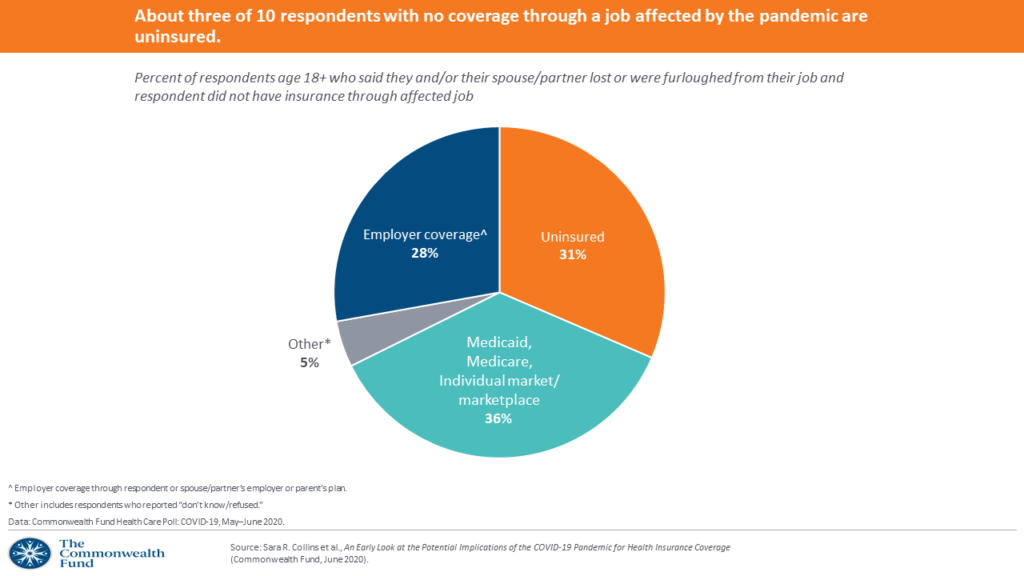 As health insurance for working-age people is tied to employment, COVID-19 led to disproportionate loss of health plan coverage especially among people earning lower incomes, as well as non-white workers, explained in the Commonwealth Fund Health Care Poll: COVID-19, May-June 2020.
As health insurance for working-age people is tied to employment, COVID-19 led to disproportionate loss of health plan coverage especially among people earning lower incomes, as well as non-white workers, explained in the Commonwealth Fund Health Care Poll: COVID-19, May-June 2020.
The Commonwealth Fund commissioned interviews with 2,271 U.S. adults 18 and over between 13 May and 2nd June 2020 for this study.
The survey has two lenses: first, on health insurance coverage among working people; and second, how people feel about donning masks, being tested and tracking in the pandemic era.
Two in five working adults in the U.S. whose jobs were disrupted — either through loss, furlough, or reduced hours — reported that they or their partner, or both, had insurance through work. 41% of those lost their livelihood due to the COVID-19 crisis retained their health insurance.
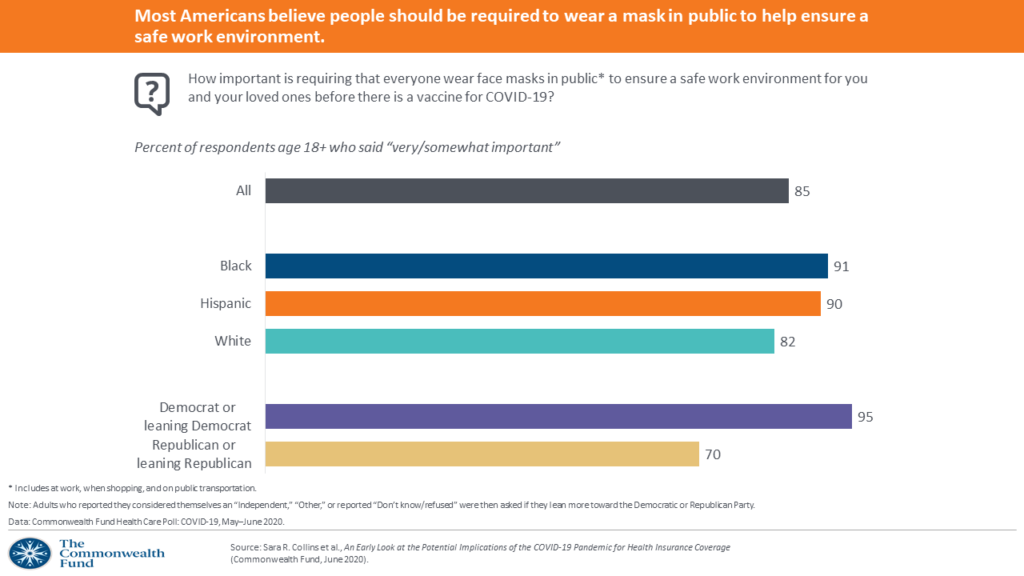 However, the percentage of workers losing jobs holding on health insurance in the pandemic has varied by race:
However, the percentage of workers losing jobs holding on health insurance in the pandemic has varied by race:
- 56% who reported employer-based health insurance through an affected job were white
- 23% were Hispanic
- 15% were Black.
Now, let’s shift to the issues of masks, testing and tracking.
Contrary to the behavior we see featured on TV and social media, the mass majority of U.S. adults believes that people should be required to wear masks in public to ensure a safe work environment.
Favoring mask-wearing garners majority support across people who are Black (91%), Hispanic (90%), and White (82%), with marginally fewer White people in support of mandatory mask wearing at work.
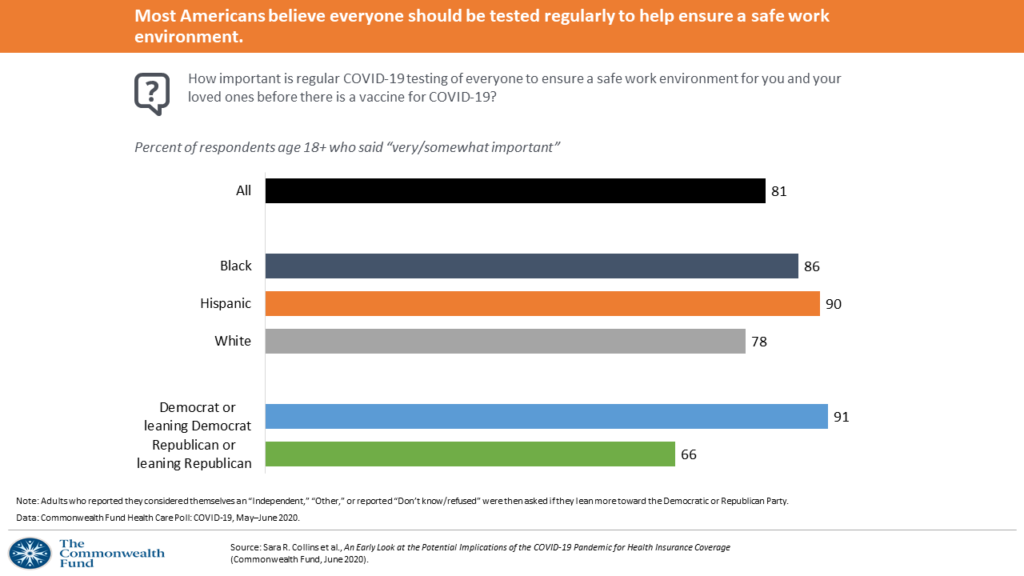 Mandatory mask-wearing also attracts majorities of consumers across political party: nearly all Democrats (95%) and Republicans (70%) favor masks to ensure a healthy workplace.
Mandatory mask-wearing also attracts majorities of consumers across political party: nearly all Democrats (95%) and Republicans (70%) favor masks to ensure a healthy workplace.
As many states “go green” to open offices, retail, and other parts of local economies tomorrow, most U.S. adults also believe everyone should be regularly tested to ensure a safe work environment.
Once again, most Democrats and Republicans believe in testing to assure safe workspaces. Most people across racial segments also favor testing for safety at work, albeit fewer White adults feeling that way (78% vs 81% overall).
The third pillar of CDC-recommended COVID-19 workflows for assuring public health is the issue of tracking. The question posed was, “How important is the ability of the government to trace potential contacts with anyone who tests positive for COVID-19 to ensure a safe work environment for you and your loved ones before there is a vaccine for COVID-19?”
Note that 4 in 5 people believe contact tracing would be important, again across political party and race.
Health Populi’s Hot Points: The Commonwealth Fund study makes it clear that most people in America “believe” that covering our faces, getting tested, and tracked for COVID positive results are important pillars for going back to work safely and healthfully.
These agreements cross political party and race, in majorities.
This is grassroots consensus from the ground up, across U.S. adults, who are also voters.
On the health insurance part of the poll, one-third of people who lost their jobs were also uninsured before COVID-19 emerged in the U.S.
Today, President Trump has been expected to file a legal brief to the Supreme Court to strike down the Affordable Care Act.
Since the pandemic hit the U.S., about 27 million people in the country have lost their health insurance due to COVID-19.
The short-term fix to the gap of health insurance loss would be to expand Medicaid in the 14 states that have not done so, and to make premiums more affordable in the ACA marketplaces extending subsidies “up the income scale,” the Commonwealth Fund recommends.
The COVID-19 pandemic has revealed many weaknesses in the U.S. health care system: millions of people lacked health insurance entering the crisis. With job losses, the pool of uninsured people in the U.S. has grown. The 2018 mid-term elections in the U.S. drove Americans to their neighborhood polls as healthcare voters. The coronavirus will inspire even more U.S. voters to take on their role as health citizens in November 2020.


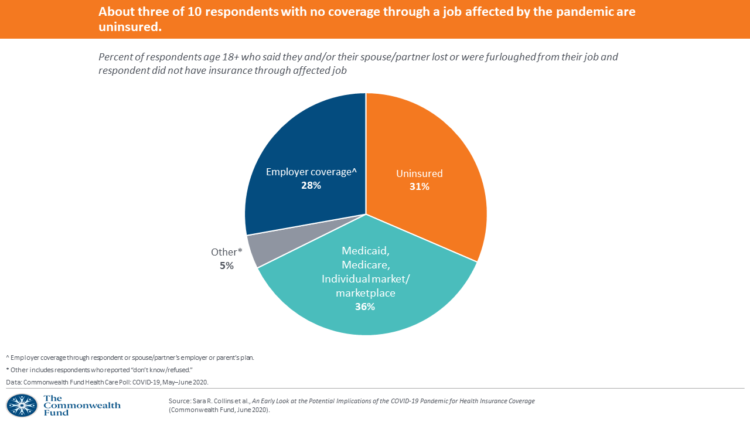


 Thank you,
Thank you, 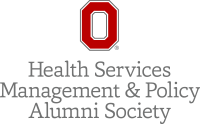 As a proud Big Ten alum, I'm thrilled to be invited to
As a proud Big Ten alum, I'm thrilled to be invited to  I was invited to be a Judge for the upcoming CES 2025 Innovation Awards in the category of digital health and connected fitness. So grateful to be part of this annual effort to identify the best in consumer-facing health solutions for self-care, condition management, and family well-being. Thank you, CTA!
I was invited to be a Judge for the upcoming CES 2025 Innovation Awards in the category of digital health and connected fitness. So grateful to be part of this annual effort to identify the best in consumer-facing health solutions for self-care, condition management, and family well-being. Thank you, CTA!